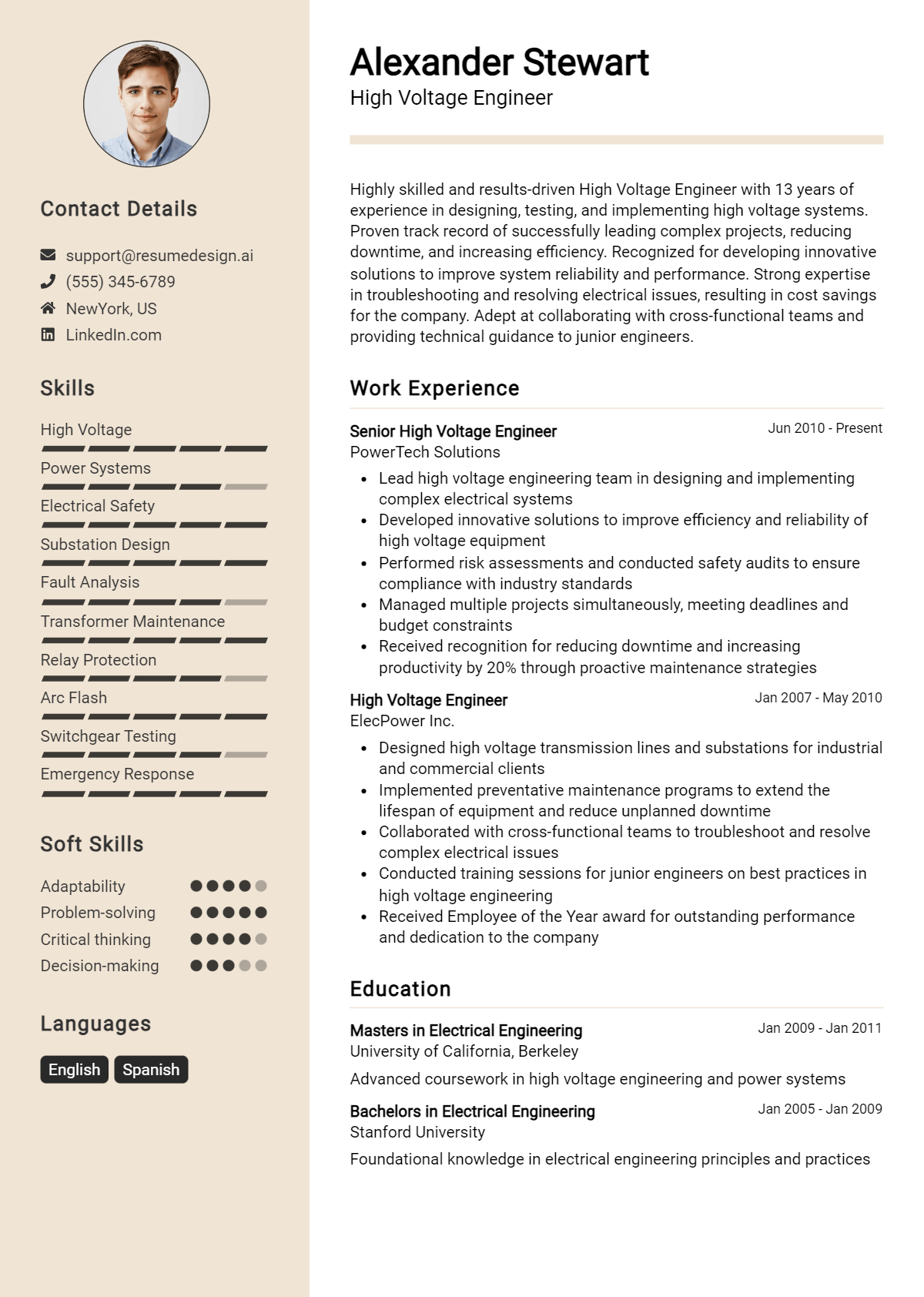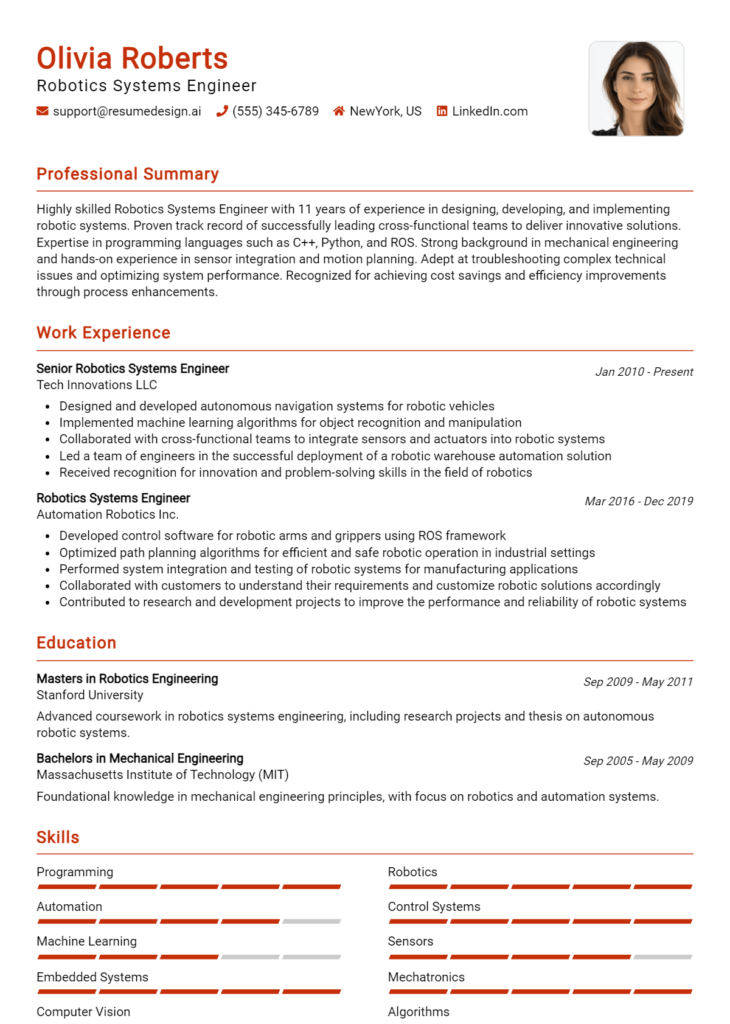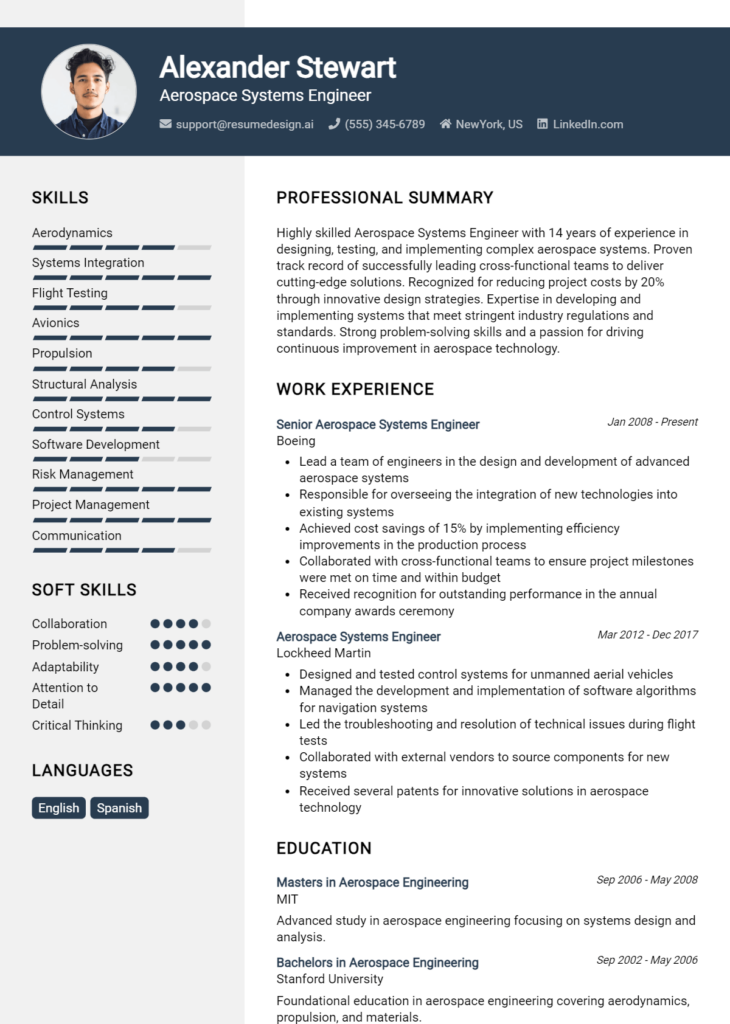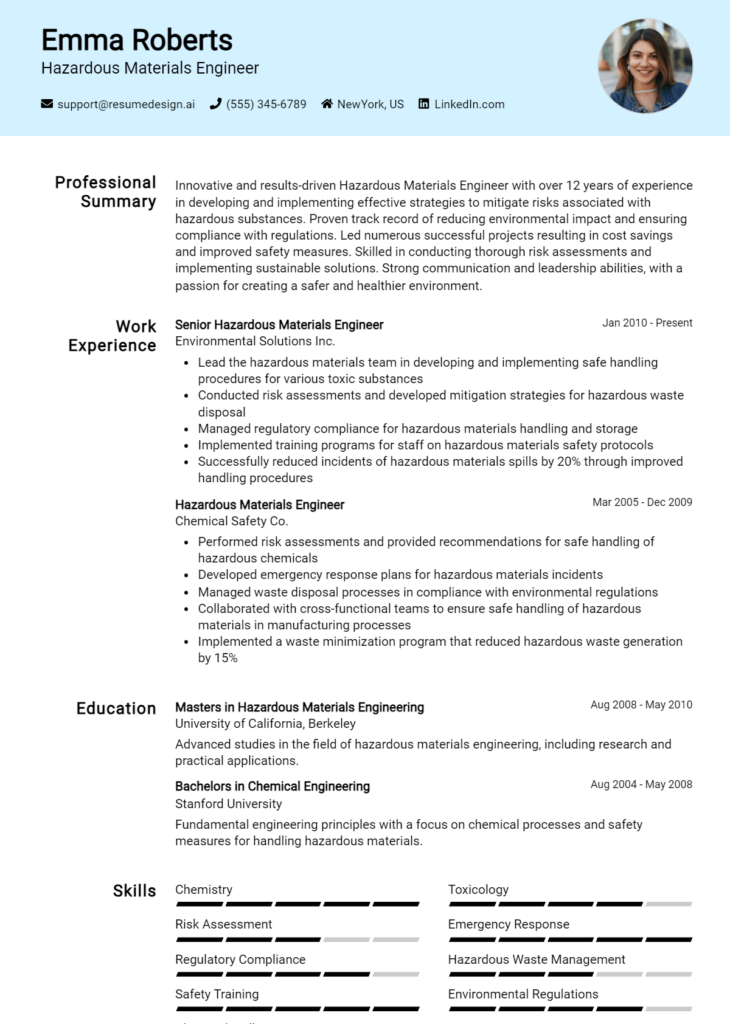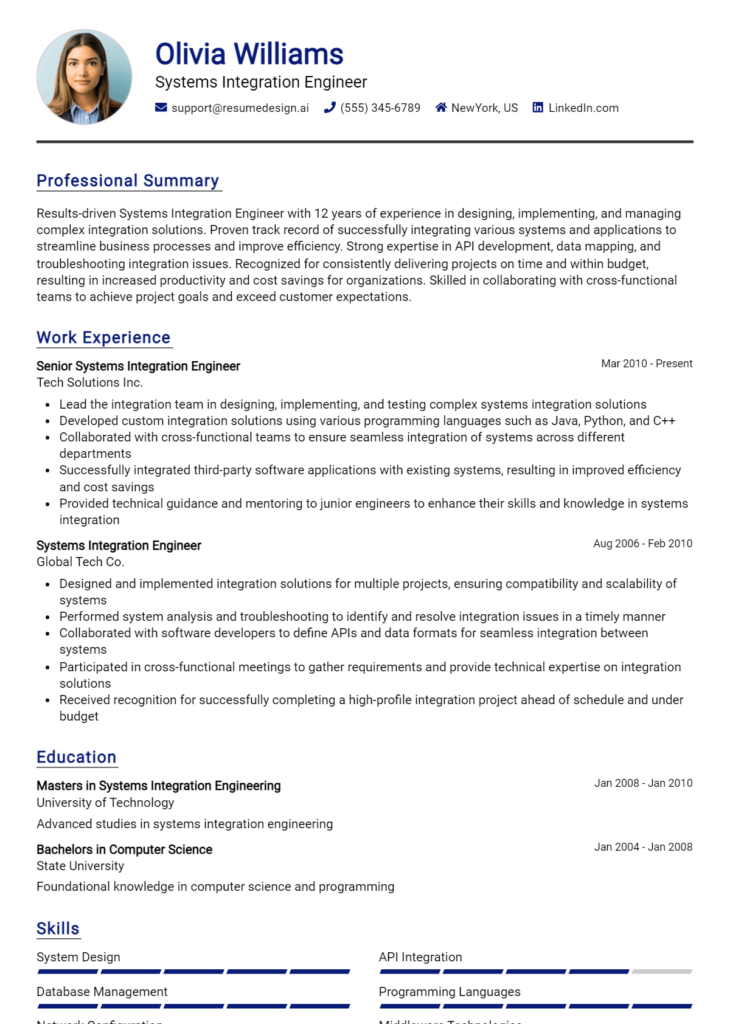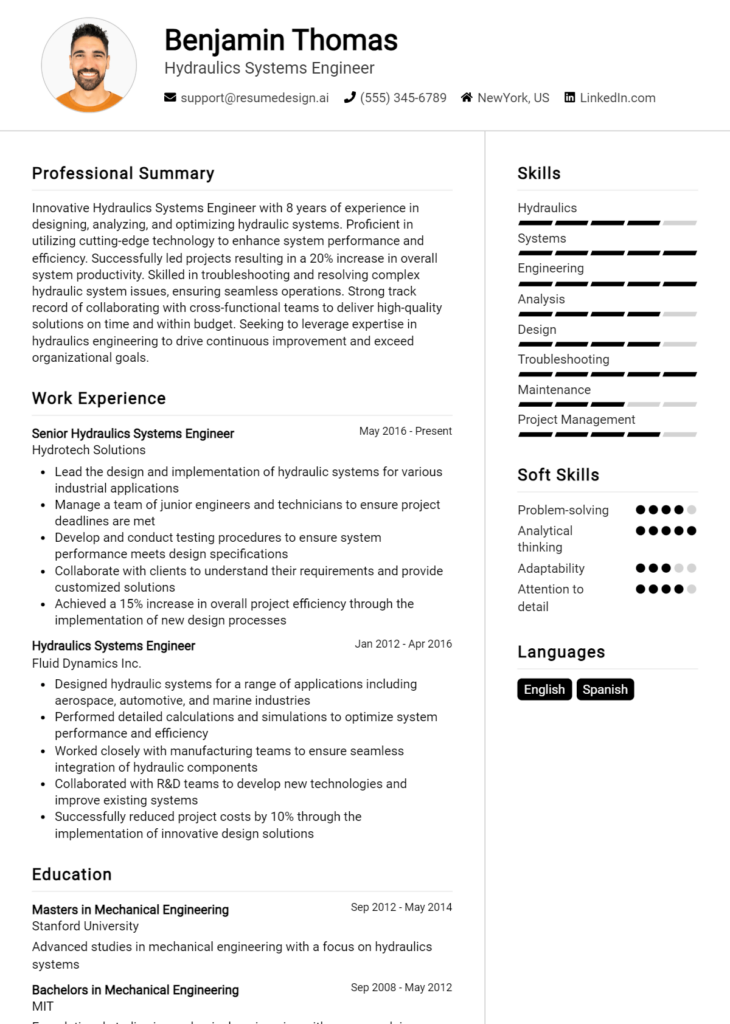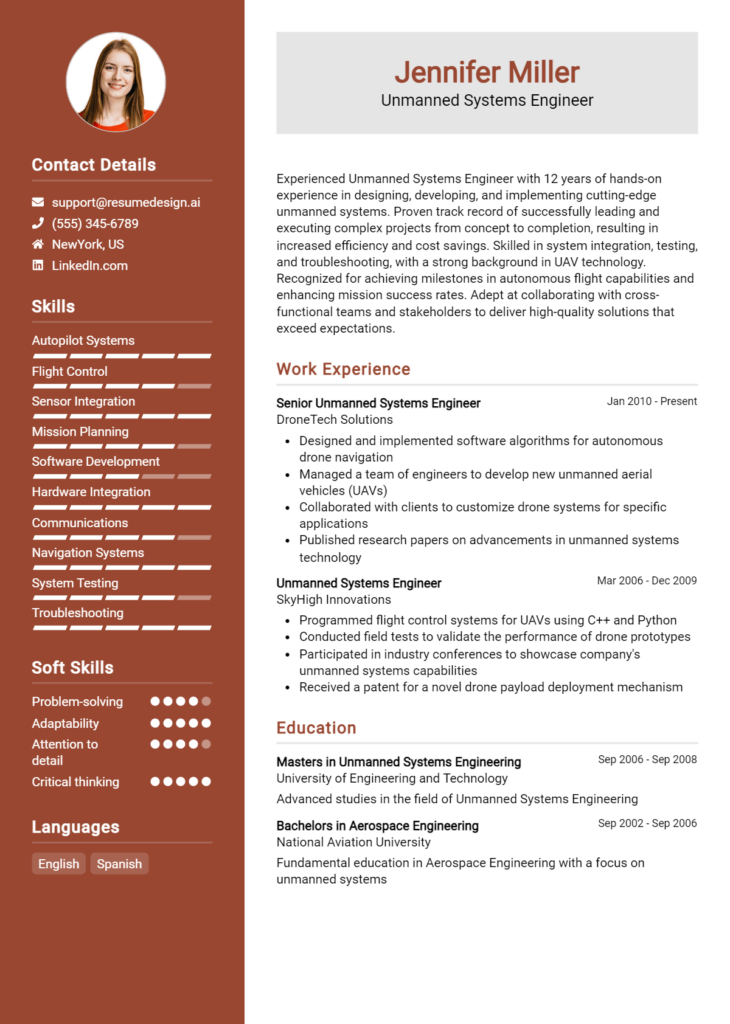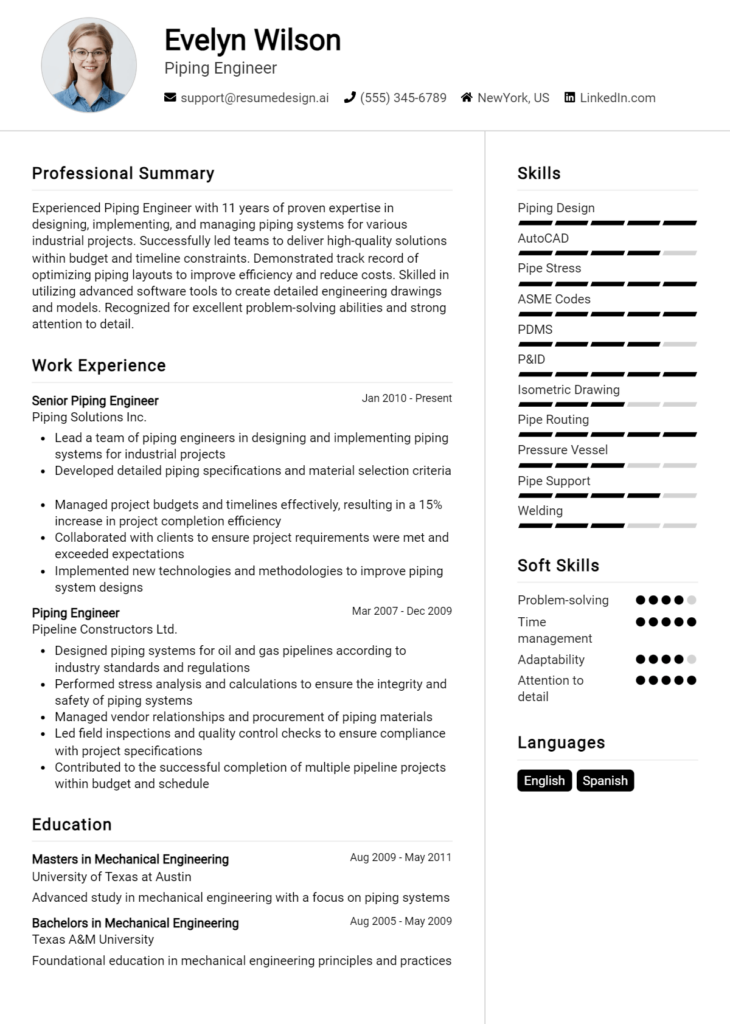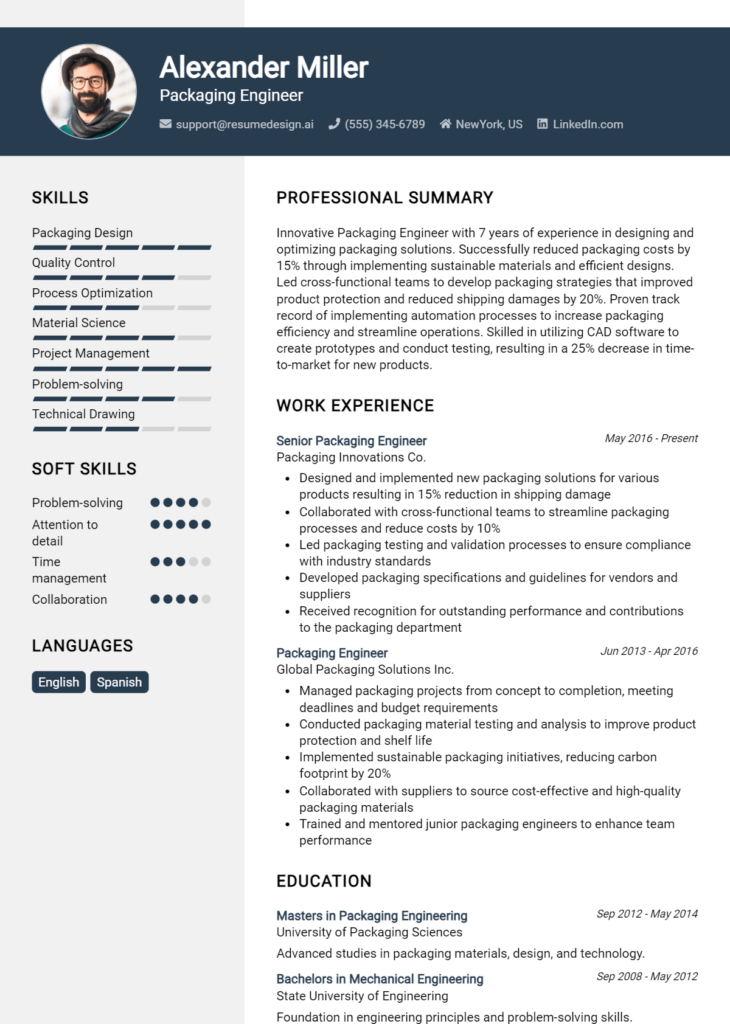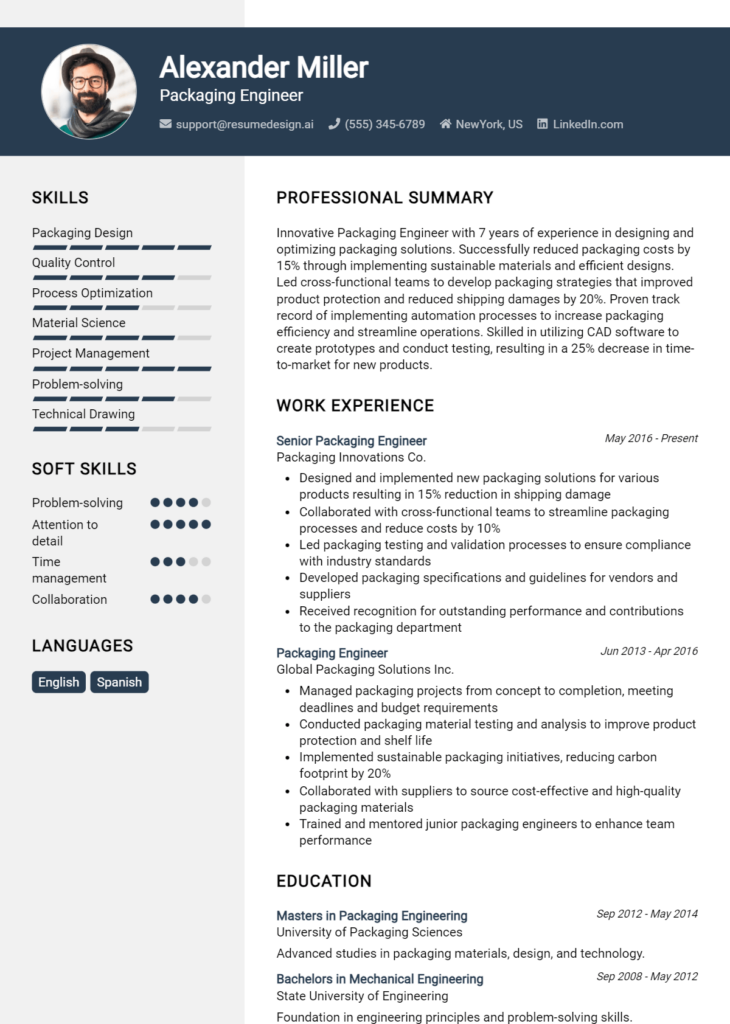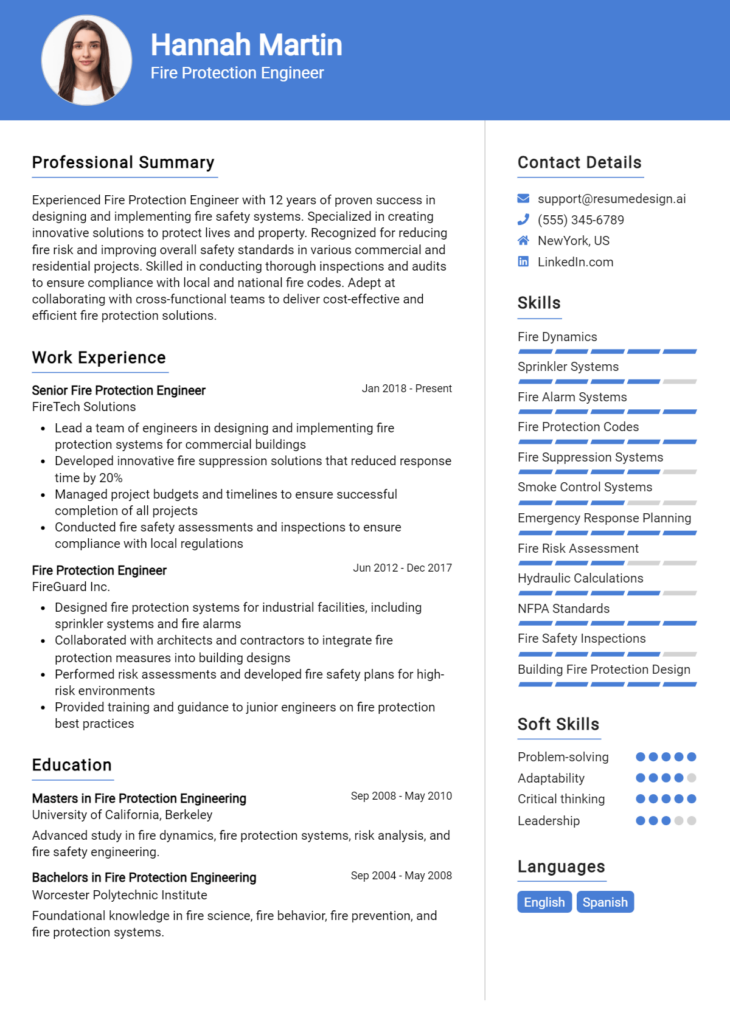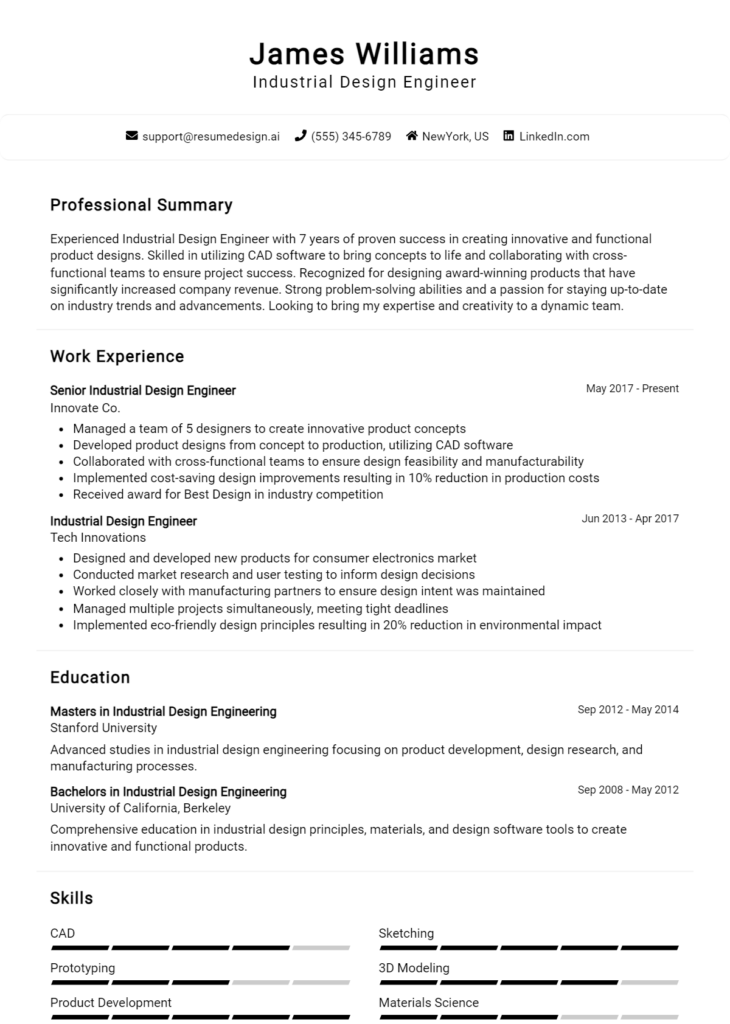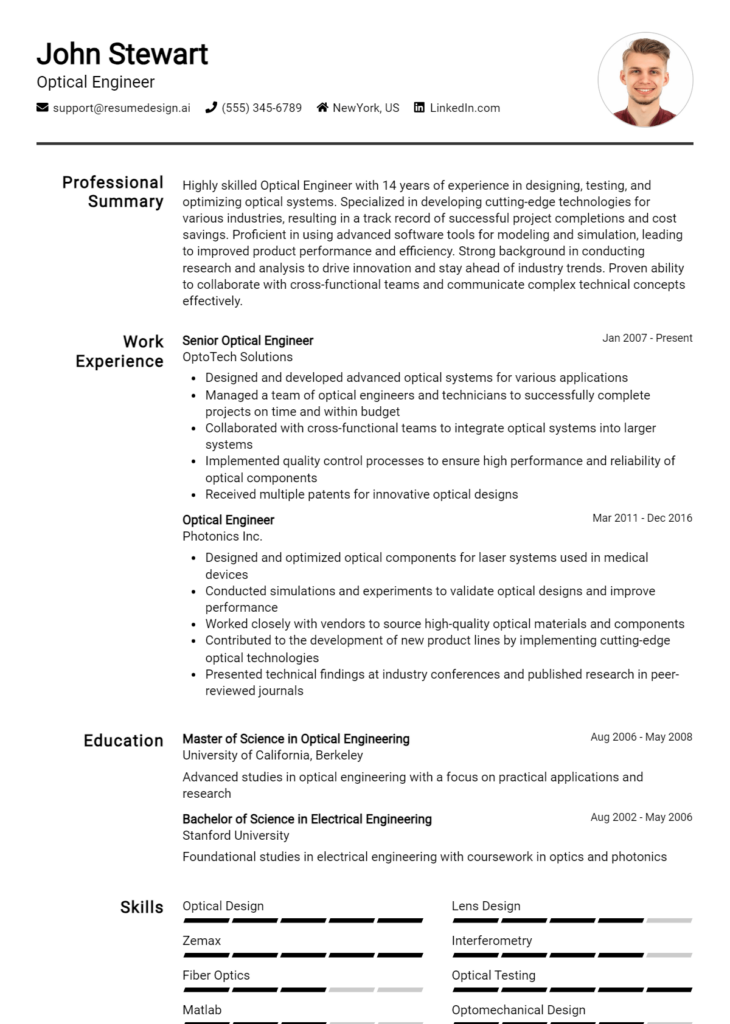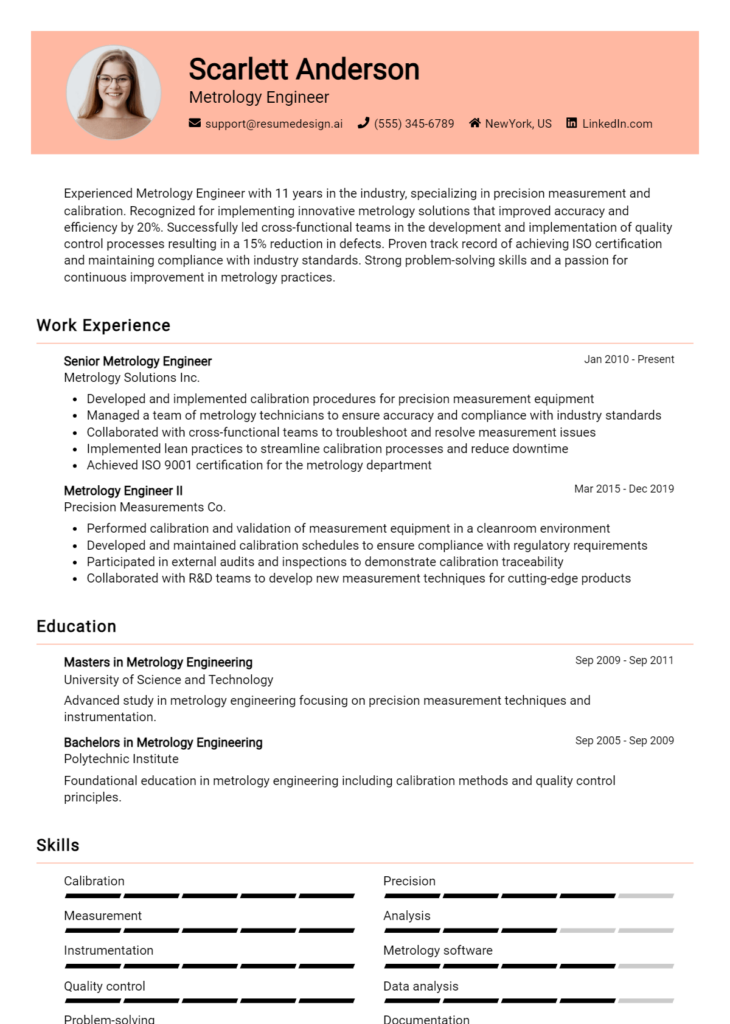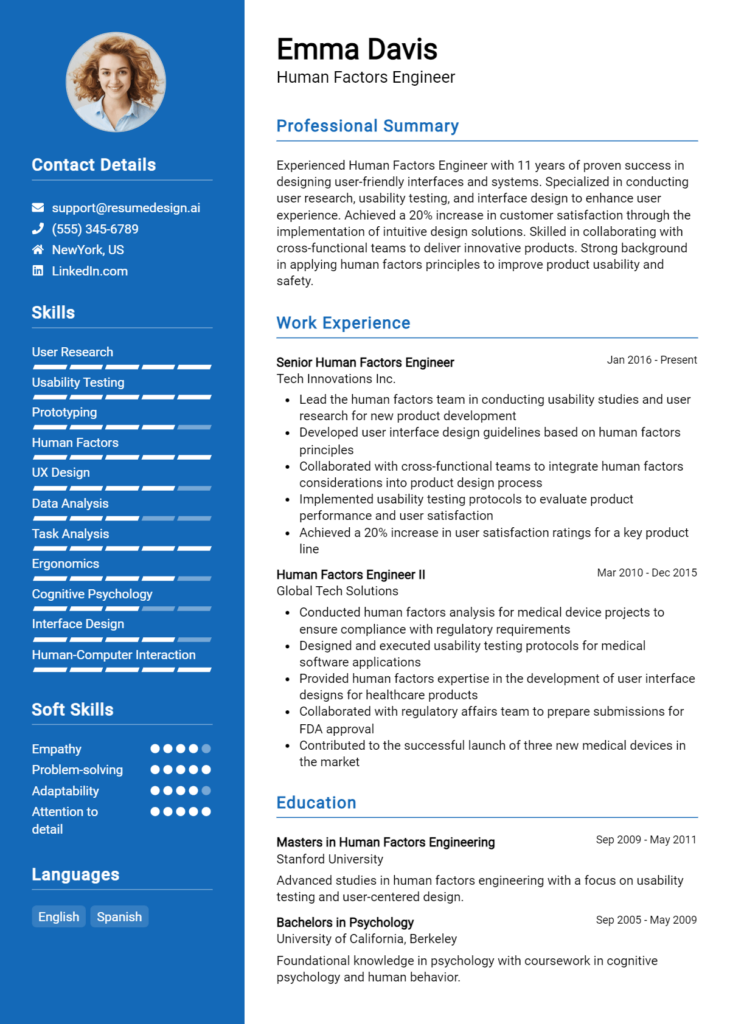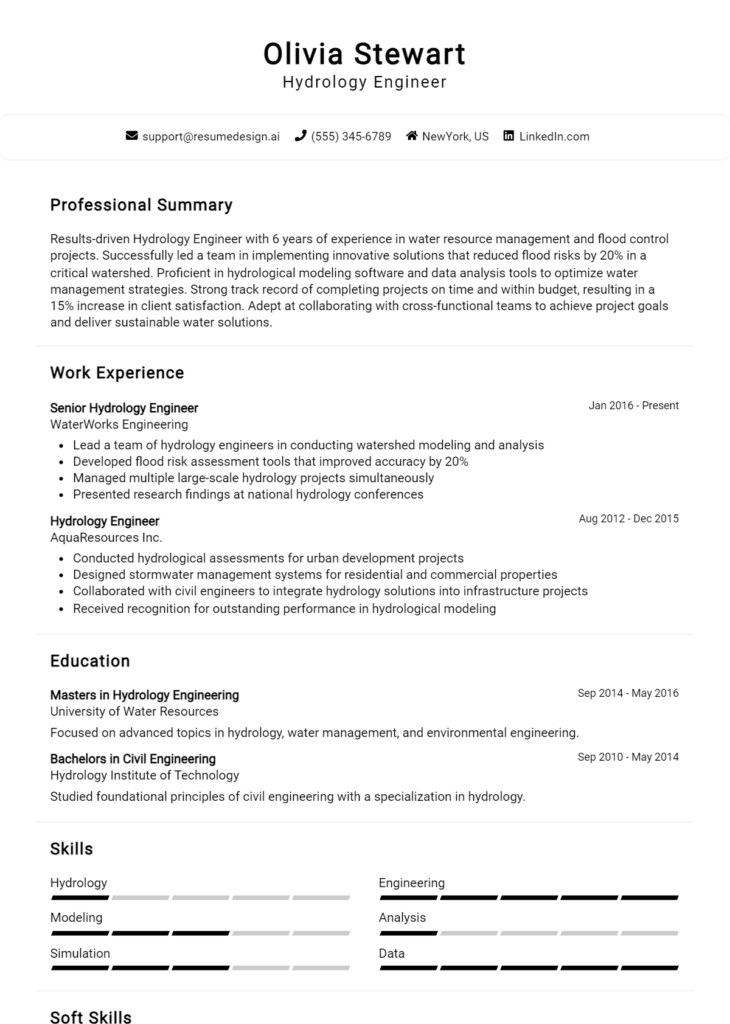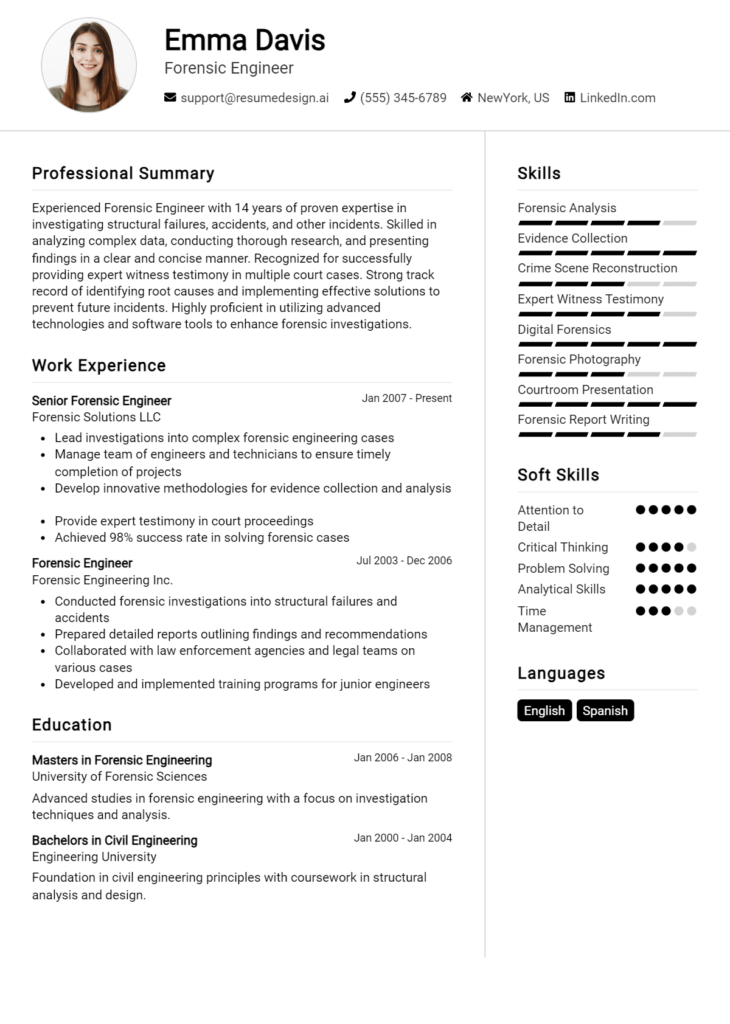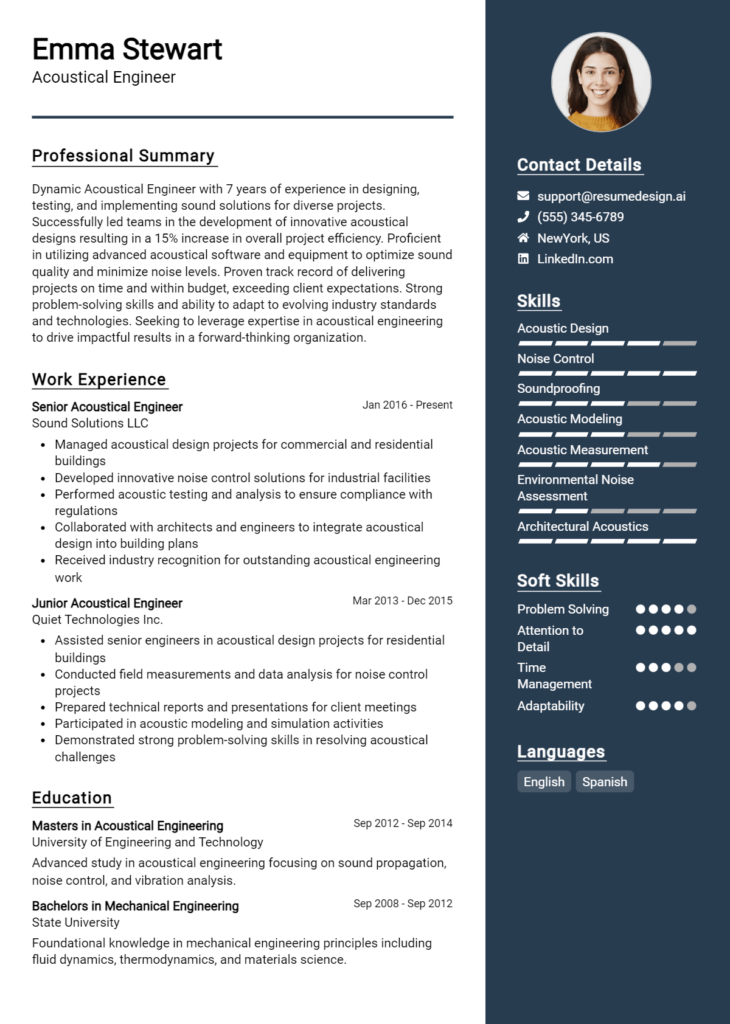High Voltage Engineer Core Responsibilities
A High Voltage Engineer is pivotal in ensuring the safety and efficiency of electrical systems that operate at high voltages. They are responsible for designing, testing, and maintaining high voltage equipment, coordinating across various departments such as operations, safety, and project management. Essential skills include technical expertise in electrical engineering, operational awareness, and strong problem-solving abilities. These competencies contribute significantly to the organization's goals, ensuring reliability and safety in power distribution. A well-structured resume can effectively highlight these qualifications, showcasing the candidate's readiness to tackle complex challenges.
Common Responsibilities Listed on High Voltage Engineer Resume
- Design and implement high voltage systems and equipment.
- Conduct risk assessments and safety evaluations for high voltage operations.
- Test and troubleshoot high voltage electrical systems.
- Collaborate with cross-functional teams to ensure project alignment.
- Develop and maintain documentation for high voltage projects.
- Oversee installation and commissioning of high voltage equipment.
- Monitor system performance and recommend improvements.
- Ensure compliance with industry regulations and standards.
- Provide technical support and training to staff on high voltage systems.
- Participate in emergency response planning for high voltage incidents.
- Analyze data and prepare reports on system performance.
- Stay updated on advancements in high voltage technology and practices.
High-Level Resume Tips for High Voltage Engineer Professionals
In the competitive field of High Voltage Engineering, a well-crafted resume is crucial for making a strong first impression on potential employers. Your resume serves as a snapshot of your professional journey, skills, and achievements, and it needs to effectively communicate your qualifications for the role. A compelling resume not only highlights your technical expertise but also showcases your accomplishments in a way that resonates with hiring managers. This guide will provide practical and actionable resume tips specifically tailored for High Voltage Engineer professionals, ensuring that your application stands out in a crowded job market.
Top Resume Tips for High Voltage Engineer Professionals
- Tailor your resume to the specific job description, emphasizing relevant skills and experiences that match the requirements.
- Use industry-specific terminology and jargon to demonstrate your familiarity with High Voltage Engineering concepts.
- Showcase your relevant experience clearly, including internships, projects, and previous positions in the field.
- Quantify your achievements by including metrics, such as improved safety records, project completion times, or cost savings.
- Highlight any certifications and licenses relevant to High Voltage Engineering, such as PE (Professional Engineer) or specific safety certifications.
- Include a section on technical skills, focusing on software, tools, and technologies commonly used in High Voltage Engineering.
- Utilize action verbs to describe your responsibilities and accomplishments, creating a dynamic and engaging narrative.
- Keep your resume concise and well-organized, using bullet points for easy readability and clear section headings.
- Incorporate keywords from the job posting to increase your chances of passing through Applicant Tracking Systems (ATS).
- Consider including a brief summary or objective at the top, outlining your career goals and what you bring to the role.
By implementing these tips, you can significantly increase your chances of landing a job in the High Voltage Engineer field. A focused and well-structured resume not only highlights your qualifications but also demonstrates your commitment to the profession, making you a more attractive candidate to potential employers.
Why Resume Headlines & Titles are Important for High Voltage Engineer
In the competitive field of high voltage engineering, a well-crafted resume headline or title serves as a critical first impression for potential employers. It functions as a succinct summary of the applicant's key qualifications, drawing the attention of hiring managers who may sift through numerous resumes. A strong headline encapsulates the candidate's unique strengths and experiences in a single, impactful phrase, making it easier for recruiters to quickly gauge suitability for the role. It should be concise, relevant, and directly aligned with the specific job being applied for, effectively setting the tone for the rest of the resume.
Best Practices for Crafting Resume Headlines for High Voltage Engineer
- Keep it concise—aim for one impactful phrase.
- Use industry-specific terminology that resonates with hiring managers.
- Highlight your key skills and experiences relevant to high voltage engineering.
- Incorporate measurable achievements to demonstrate your impact.
- Tailor your headline to match the specific job description.
- Avoid clichés and generic terms to stand out.
- Use action-oriented language to convey confidence.
- Consider including certifications or specializations as part of the headline.
Example Resume Headlines for High Voltage Engineer
Strong Resume Headlines
Innovative High Voltage Engineer with 8+ Years in Power Systems Design and Maintenance
Certified High Voltage Specialist Focused on Safety and Efficiency Improvements
Results-Driven Engineer with Proven Track Record in High Voltage Project Management
Dynamic Electrical Engineer with Expertise in High Voltage Equipment Testing and Standards Compliance
Weak Resume Headlines
Engineer Looking for Jobs
High Voltage Engineer with Experience
The strong headlines are effective because they provide specific information about the candidate's qualifications, experience, and unique value proposition, capturing the essence of what makes them a suitable fit for the role. They are tailored to the job and use relevant language that speaks to the industry. In contrast, the weak headlines fail to impress due to their vague nature, lack of detail, and inability to convey any unique strengths or accomplishments, making it difficult for hiring managers to see the candidate's potential at a glance.
Writing an Exceptional High Voltage Engineer Resume Summary
A well-crafted resume summary is essential for a High Voltage Engineer as it serves as the first impression a hiring manager receives. It quickly encapsulates the candidate's key skills, relevant experience, and notable accomplishments, making it an invaluable tool in a competitive job market. A strong summary is concise yet impactful, effectively drawing attention to the qualifications that align with the specific requirements of the job being applied for. By presenting a compelling snapshot of the candidate’s expertise, the summary can significantly enhance the chances of progressing through the hiring process.
Best Practices for Writing a High Voltage Engineer Resume Summary
- Quantify achievements to demonstrate impact (e.g., "reduced downtime by 30%").
- Focus on specific technical skills relevant to high voltage engineering.
- Tailor the summary to match the job description and requirements.
- Highlight relevant certifications or licenses (e.g., PE license, NETA certification).
- Incorporate industry-specific terminology to showcase expertise.
- Keep it concise, ideally within 3-5 sentences.
- Emphasize problem-solving abilities and project management experience.
- Use action-oriented language to convey accomplishments and contributions.
Example High Voltage Engineer Resume Summaries
Strong Resume Summaries
Dynamic High Voltage Engineer with over 8 years of experience in designing and implementing electrical systems for industrial applications. Successfully led projects that increased system reliability by 25% and reduced operational costs by 15% through innovative design solutions.
Results-driven High Voltage Engineer specializing in high-voltage transmission and distribution systems. Proven track record of managing multi-million dollar projects, achieving a 95% on-time delivery rate, and implementing safety protocols that reduced incidents by 40%.
Detail-oriented High Voltage Engineer with expertise in power system analysis and equipment testing. Developed and executed testing procedures that improved system efficiency by 20%, while ensuring compliance with industry standards and regulations.
Weak Resume Summaries
High Voltage Engineer with some experience in the field. I am looking for a new opportunity to grow my skills and contribute to my team.
Engineer with a background in electrical systems. I have worked on various projects and am interested in high voltage engineering positions.
The strong resume summaries exemplify clarity and specificity, showcasing quantifiable results and relevant skills tailored to the High Voltage Engineer role. They highlight concrete achievements and the candidate's expertise, making them stand out to hiring managers. In contrast, the weak summaries lack detail and specificity, offering vague descriptions that do not effectively convey the candidate's qualifications or impact in their previous roles. This makes them less compelling and memorable to potential employers.
Work Experience Section for High Voltage Engineer Resume
The work experience section of a High Voltage Engineer resume is crucial as it serves as a testament to the candidate's technical abilities, leadership skills, and capacity to deliver high-quality projects. This section allows potential employers to gauge the applicant's hands-on experience with high voltage systems, their proficiency in managing teams, and their track record in producing results that meet or exceed industry standards. By quantifying achievements and aligning work experiences with best practices in the field, candidates can effectively demonstrate their value to prospective employers and stand out in a competitive job market.
Best Practices for High Voltage Engineer Work Experience
- Highlight specific technical skills relevant to high voltage engineering, such as circuit design, testing, and maintenance.
- Quantify your achievements, using metrics like cost savings, efficiency improvements, or project success rates.
- Include leadership roles or experiences where you managed teams or projects, showcasing your ability to guide others.
- Align your work experience with industry standards and best practices to demonstrate your knowledge of current technologies.
- Use action verbs to convey a sense of initiative and impact, such as "developed," "implemented," or "led."
- Emphasize collaboration with cross-functional teams, illustrating your ability to work effectively with diverse groups.
- Tailor your work experience to the specific job you are applying for, focusing on the most relevant roles and responsibilities.
- Maintain clarity and conciseness, ensuring that each bullet point conveys essential information without unnecessary jargon.
Example Work Experiences for High Voltage Engineer
Strong Experiences
- Led a team of 10 engineers in the successful design and implementation of a new high voltage transmission system, resulting in a 20% reduction in energy losses.
- Developed and executed a maintenance program for high voltage equipment that improved reliability by 30% and decreased downtime.
- Collaborated with cross-functional teams to complete a $5 million project ahead of schedule, achieving a customer satisfaction rate of 95%.
- Implemented advanced testing procedures for high voltage circuit breakers, which increased safety compliance by 40% over two years.
Weak Experiences
- Worked on high voltage projects.
- Assisted with maintenance tasks.
- Participated in team meetings regarding engineering.
- Helped improve systems.
The examples listed above are considered strong because they provide specific, quantifiable outcomes and demonstrate technical leadership and collaboration. They clearly outline the candidate's contributions to significant projects, showcasing their impact on efficiency, safety, and customer satisfaction. In contrast, the weak experiences lack detail and fail to convey any measurable achievements or significant roles, which diminishes their effectiveness in showcasing the candidate's value as a high voltage engineer.
Education and Certifications Section for High Voltage Engineer Resume
The Education and Certifications section of a High Voltage Engineer resume plays a critical role in establishing the candidate's qualifications and expertise in a highly specialized field. This section not only showcases the academic background essential for understanding complex electrical systems but also highlights industry-relevant certifications and ongoing professional development efforts. By providing information on relevant coursework, specialized training, and recognized qualifications, candidates can significantly enhance their credibility and demonstrate alignment with the job role, making them more attractive to potential employers.
Best Practices for High Voltage Engineer Education and Certifications
- Include degrees in Electrical Engineering or related fields, emphasizing relevant coursework.
- Highlight certifications from recognized organizations, such as the Institute of Electrical and Electronics Engineers (IEEE) or the National Fire Protection Association (NFPA).
- Detail any specialized training related to high voltage systems, safety protocols, or equipment handling.
- Use clear headings and bullet points for easy readability and to draw attention to key qualifications.
- Focus on certifications that demonstrate current knowledge of industry standards and practices.
- Consider including ongoing education efforts, such as workshops or online courses, to show commitment to continuous learning.
- Keep the section organized chronologically, starting with the most recent education or certification.
- Avoid listing outdated or irrelevant credentials that do not pertain to the high voltage engineering field.
Example Education and Certifications for High Voltage Engineer
Strong Examples
- Bachelor of Science in Electrical Engineering, University of Technology, 2020
- Certified High Voltage Safety Specialist (CHVSS), National Safety Council, 2021
- Advanced Course in High Voltage Engineering and Insulation Systems, Online Institute, 2022
- Master of Science in Power Systems Engineering, Technical University, 2023 (in progress)
Weak Examples
- Bachelor of Arts in History, State University, 2018
- Basic Electrical Safety Certification, Local Community College, 2015
- Certification in Microsoft Office Applications, Online Course, 2019
- High School Diploma, Generic High School, Graduated 2010
The strong examples listed above are considered relevant and beneficial as they directly align with the requirements of a High Voltage Engineer, showcasing appropriate academic qualifications, specialized certifications, and relevant training. In contrast, the weak examples highlight degrees and certifications that do not pertain to the high voltage engineering field, potentially misleading employers about the candidate's qualifications and expertise. By clearly differentiating between strong and weak examples, candidates can better tailor their resumes to meet the specific needs of potential employers.
Top Skills & Keywords for High Voltage Engineer Resume
When crafting a resume for a High Voltage Engineer position, highlighting the right skills is crucial to make a strong impression on potential employers. The electrical engineering field, particularly in high voltage systems, demands a unique blend of technical expertise and interpersonal abilities. A well-structured resume that emphasizes both hard and soft skills can effectively showcase a candidate's qualifications and fit for the role. Employers are increasingly looking for candidates who not only possess the necessary technical knowledge but also demonstrate strong problem-solving abilities, effective communication, and teamwork skills. By including relevant skills in your resume, you can better position yourself as an ideal candidate for high voltage engineering roles.
Top Hard & Soft Skills for High Voltage Engineer
Hard Skills
- High voltage system design
- Circuit analysis
- Electrical safety standards
- Power distribution systems
- Electrical testing and troubleshooting
- Transformer operation and maintenance
- Protective relay coordination
- Load flow analysis
- SCADA and control systems
- Cable installation and termination
- EMI/EMC testing
- Renewable energy systems integration
- Technical report writing
- Project management
- AutoCAD and electrical design software
- Compliance with industry regulations
- Risk assessment and mitigation
Soft Skills
- Problem-solving
- Attention to detail
- Communication skills
- Team collaboration
- Analytical thinking
- Adaptability
- Time management
- Leadership abilities
- Conflict resolution
- Customer service orientation
- Critical thinking
- Creativity
- Initiative
- Emotional intelligence
- Networking skills
- Negotiation skills
- Mentoring and training capabilities
In addition to these skills, showcasing relevant work experience can further enhance your resume, illustrating your ability to apply your skills in real-world scenarios.
Stand Out with a Winning High Voltage Engineer Cover Letter
I am writing to express my interest in the High Voltage Engineer position at [Company Name], as advertised on [Job Board/Company Website]. With a robust background in electrical engineering and extensive experience in high voltage systems design and maintenance, I am excited about the opportunity to contribute to your team. Throughout my career, I have developed a strong foundation in power system engineering, focusing on high voltage transmission and distribution, which aligns perfectly with the requirements of this role.
In my previous position at [Previous Company Name], I successfully led several high voltage projects, including the design and implementation of a new transmission line that improved system reliability by 30%. My expertise in performing risk assessments and ensuring compliance with safety regulations has proven essential in minimizing downtime and enhancing operational efficiency. I am particularly proud of my ability to collaborate with cross-functional teams to troubleshoot complex electrical issues, ensuring that all projects meet their deadlines and budgetary constraints.
I am eager to bring my analytical skills and innovative approach to problem-solving to [Company Name]. I am particularly impressed by your commitment to sustainable energy solutions and believe that my experience in renewable energy projects, such as integrating solar and wind power into existing high voltage infrastructure, would provide valuable insights to your team. I am dedicated to continuous professional development and am currently pursuing additional certifications in high voltage engineering to stay abreast of industry advancements.
Thank you for considering my application for the High Voltage Engineer position. I look forward to the opportunity to discuss how my skills and experiences align with the goals of [Company Name]. I am excited about the possibility of contributing to your projects and would welcome the chance for an interview to further discuss how I can help drive success for your team.
Common Mistakes to Avoid in a High Voltage Engineer Resume
When applying for a position as a High Voltage Engineer, having a well-crafted resume is essential to stand out in a competitive job market. However, many candidates make common mistakes that can undermine their qualifications and expertise. By avoiding these pitfalls, you can enhance your resume's effectiveness and increase your chances of landing an interview. Here are some frequent errors to watch out for:
Lack of Specificity: Failing to provide detailed descriptions of your technical skills and projects can make your resume vague. Be specific about your experience with high voltage systems and related technologies.
Ignoring Keywords: Many employers use applicant tracking systems (ATS) to screen resumes. Not incorporating relevant keywords from the job description can lead to your resume being overlooked.
Overloading with Technical Jargon: While your role involves specialized knowledge, using too much technical jargon can alienate readers. Aim for clarity and ensure your resume can be understood by both technical and non-technical individuals.
Not Highlighting Certifications: High Voltage Engineers often require specific certifications or licenses. Failing to prominently display these qualifications can make your resume less compelling.
Neglecting Soft Skills: Technical expertise is crucial, but soft skills such as communication, teamwork, and problem-solving are equally important. Be sure to include examples that demonstrate these abilities.
Inconsistent Formatting: A cluttered or inconsistent format can distract from your qualifications. Use a clean, professional layout with uniform fonts and spacing to enhance readability.
Using Generic Objectives: A generic objective statement can lack impact. Tailor your objective to reflect your career goals and how they align with the specific role you’re applying for.
Failing to Quantify Achievements: Not providing measurable results from your previous work can make it difficult for employers to gauge your contributions. Use metrics and data to illustrate your accomplishments, such as reductions in downtime or improvements in safety protocols.
Conclusion
As we explored the essential responsibilities and skills required for a High Voltage Engineer, it's clear that this role demands a blend of technical expertise, problem-solving abilities, and safety awareness. High Voltage Engineers are pivotal in designing, maintaining, and troubleshooting electrical systems that operate at high voltages, ensuring both efficiency and safety in power distribution. Key competencies include a solid understanding of electrical engineering principles, familiarity with safety regulations, and proficiency in using specialized tools and software.
In addition to technical skills, effective communication and teamwork are vital, as High Voltage Engineers often collaborate with other engineers and stakeholders to implement projects successfully. Continuous learning and staying updated with industry advancements are also crucial for career growth in this field.
As you reflect on these insights, it's the perfect time to enhance your professional profile. Ensure your resume showcases your unique skills and experiences effectively. Take advantage of the resources available to you, such as resume templates, resume builder, resume examples, and cover letter templates. These tools can help you create a standout resume and cover letter that align with the demands of the High Voltage Engineering field. Don’t miss the opportunity to present yourself in the best light; start enhancing your resume today!

